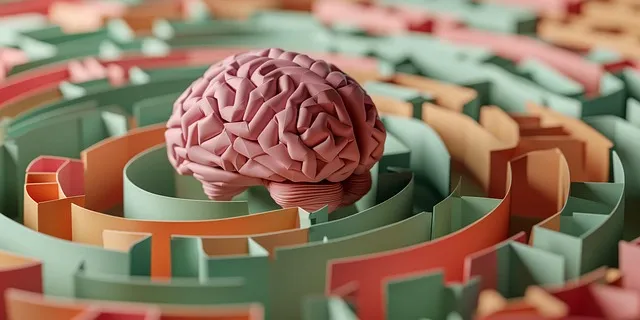Golden Kaiser Permanente offers holistic mental health services centered on emotional intelligence (EQ), a key factor in resilience, emotion management, and relationship enhancement. Their Mental Wellness Podcast Series, therapy, counseling, and support groups focus on EQ development, depression prevention, and more. This approach aims to create a supportive environment for clients to navigate challenges with ease. Comprehensive services include mindfulness practices, positive thinking techniques, and risk management planning for professionals, fostering self-awareness, empathy, and improved communication in both personal and professional settings. Self-assessment tools and structured scenarios measure EQ progress, guiding tailored interventions for better client care.
Emotional intelligence (EQ) is a powerful tool for personal and professional success, and Golden Kaiser Permanente takes a leading approach in fostering this essential skill. This article explores EQ as a foundation for well-being, delving into the impact of mental health services on its development. We’ll uncover key strategies to enhance EQ in daily life, discuss its role in relationships, and provide tools for continuous growth. By examining Golden Kaiser Permanente’s methods, we aim to inspire individuals and organizations to unlock their emotional intelligence potential through comprehensive mental health services.
- Understanding Emotional Intelligence: The Foundation of Golden Kaiser Permanente's Approach
- The Impact of Mental Health Services on EQ Development
- Key Strategies for Building Emotional Intelligence in Daily Life
- Incorporating EQ into Personal and Professional Relationships
- Measuring Progress: Tools and Techniques for Continuous Growth
Understanding Emotional Intelligence: The Foundation of Golden Kaiser Permanente's Approach

At Golden Kaiser Permanente, we recognize that emotional intelligence (EQ) is the cornerstone of holistic mental health services. Our approach is deeply rooted in understanding and nurturing the intricate connection between our emotions and overall well-being. EQ isn’t just about recognizing feelings; it’s a skill set that empowers individuals to manage their emotions effectively, fostering better relationships and enhancing resilience.
This foundation drives our Mental Wellness Podcast Series Production, where we delve into various aspects of emotional regulation, depression prevention, and other relevant topics. We believe that by promoting emotional intelligence, we can create a more supportive environment for our clients, enabling them to navigate life’s challenges with greater ease and confidence.
The Impact of Mental Health Services on EQ Development

Mental health services play a pivotal role in cultivating emotional intelligence (EQ), offering individuals valuable tools and insights into their own emotions and those of others. Organizations like Golden Kaiser Permanente provide comprehensive programs designed to enhance mental well-being, which, in turn, significantly contributes to EQ development. Through therapy sessions, counseling, and support groups, individuals learn to identify and manage their feelings, fostering self-awareness—a cornerstone of emotional intelligence.
Moreover, these services introduce effective conflict resolution techniques and empathy building strategies, equipping individuals with essential skills for navigating interpersonal interactions. Risk management planning for mental health professionals is also integral, ensuring practitioners can handle complex situations with composure, thereby modeling adaptive coping mechanisms for their clients.
Key Strategies for Building Emotional Intelligence in Daily Life

Building emotional intelligence (EI) is a powerful tool for enhancing well-being and navigating daily challenges. Key strategies to cultivate EI include integrating mindfulness practices like Meditation, which research from Golden Kaiser Permanente mental health services highlights as beneficial for stress reduction and emotional regulation. Regularly practicing Mindfulness Meditation allows individuals to develop a deeper understanding of their emotions and responses, fostering better self-awareness.
Additionally, cultivating Positive Thinking plays a crucial role in EI development. By challenging negative thought patterns and replacing them with more constructive ones, individuals can improve their emotional resilience. This not only boosts overall mental health but also helps in managing stress and anxiety effectively. Mental Illness Stigma Reduction Efforts are another important aspect, as decreasing stigma promotes open dialogue and encourages seeking support when needed, ultimately contributing to building a healthier emotional intelligence.
Incorporating EQ into Personal and Professional Relationships

Emotional intelligence (EQ) is a powerful tool that transcends mere self-awareness; it enriches both personal and professional relationships. By integrating EQ into interactions, individuals can foster deeper connections and enhance communication. This involves recognizing and managing one’s emotions effectively, which in turn promotes empathy towards others, enabling more nuanced understanding and support. At Kaiser Permanente mental health services, for instance, the emphasis on developing emotional intelligence aids professionals in offering tailored care, enhancing patient outcomes.
In personal relationships, EQ encourages active listening and open dialogue, fostering an environment of trust and respect. This is particularly beneficial when navigating challenging conversations or resolving conflicts. Professionally, incorporating EQ enhances leadership skills, team dynamics, and overall workplace culture. Leaders who demonstrate emotional intelligence create a supportive atmosphere, encouraging collaboration and innovation. Moreover, practices like mindfulness meditation and positive thinking, integral components of EQ development, contribute to better stress management and improved risk assessment for mental health professionals, ultimately benefiting both their personal well-being and the quality of care they provide.
Measuring Progress: Tools and Techniques for Continuous Growth

Measuring progress is a vital aspect of emotional intelligence development, offering individuals and organizations valuable insights into their growth. At Kaiser Permanente, their mental health services employ various tools to assess and track this journey. One effective method is self-assessment questionnaires that encourage introspection and self-awareness. These tools help individuals identify strengths and areas for improvement in emotion recognition, understanding others’ emotions, and managing personal responses.
Additionally, the Golden Standard of Emotional Intelligence assessments provides structured frameworks for evaluation. This involves analyzing performance in various scenarios, such as interpersonal interactions, conflict resolution, and stress management. The data collected from these evaluations guides tailored interventions, ensuring continuous learning. For instance, Social Skills Training can enhance communication and empathy, while Stress Reduction Methods teach effective coping strategies. Healthcare Provider Cultural Competency Training is another essential tool, fostering understanding of diverse perspectives to improve patient care and interactions.
Emotional intelligence, a cornerstone of Golden Kaiser Permanente’s approach, is enhanced through integrating mental health services into daily life. By understanding emotional nuances and fostering healthy relationships, individuals can significantly improve their EQ. The strategies outlined in this article, combined with the supportive environment that Golden Kaiser Permanente mental health services provide, offer a comprehensive path to personal and professional growth. Continuous development, measured through various tools, ensures individuals stay on track, making emotional intelligence not just a goal, but an achievable reality.






